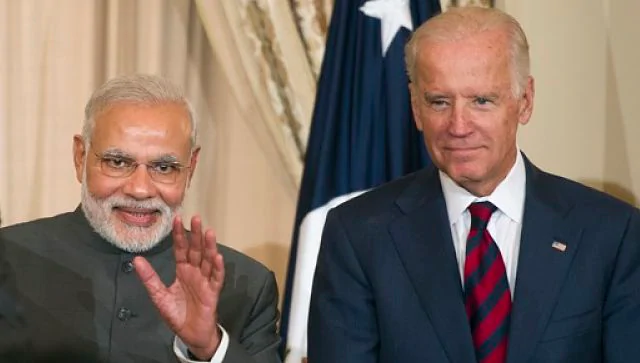‘India is key partner in engaging with China’: US, New Delhi on common ground in tackling strained ties with Beijing – World News , Firstpost
[ad_1]
The US’ ties with China and India have major ramifications for the global geopolitical scenario
File image of Narendra Modi and Joe Biden. AP
Joe Biden’s phone calls to Prime Minister Narendra Modi and Chinese president Xi Jinping earlier this week have brought renewed focus on the US’ ties with the two countries.
These ties are of growing importance to the global scenario, as the US seeks to counter China’s influence in the South Asian region, India seeks to cement its stature as the US’ ally and receive its help in defence against China, and Beijing seeks to repair bilateral ties with the US for economic gains.
However, Global Times editor Hu Xijin, in a video segment on Wednesday, claimed that India had no reason to celebrate Biden’s call to Modi and said that basing the development of India-US ties on “common democratic values is hypocritical”. He argued that Washington DC views India as “weak and looks down on it”.
He also said that the US was only favouring India to “encourage more conflict” between New Delhi and Beijing, to serve its own interests.
“If India doesn’t handle its relationship with China properly, it will be useless to develop any kind of alliances. The friendly co-existence between India and China is the foundation for India to pursue more national interests in the international arena. Only in this way would it gain any strategic initiative in its relations with the US,” he said.
However, Xijin’s analysis fails to consider the repeated statements made by US officials on its support to India, particularly in the face of an increasingly assertive China.
US Secretary of State Antony J Blinken was recently quoted as saying that “India and US face a common challenge in the form of an increasingly assertive China, and that New Delhi has to be a key partner in engaging with Beijing from a position of strength.”
Further, Biden has supported India on many occasions before becoming the US president. As a senator, Biden was an important advocate of the 2008 civil nuclear deal between the countries.
The 2008 nuclear accord paved the way for the supply of US high-tech equipment that India wanted along with the technology, an AP report noted. The accord ended India’s isolation after it conducted nuclear tests in 1998 and refused to sign the Nuclear Non-Proliferation Treaty.
The United States is also supporting India’s entry into the Nuclear Suppliers Group, a move that has been blocked by China.
In diplomatic parlance, the bilateral relations between the world’s two largest democracies are a rare bipartisan success. A strong political affinity and a tactical convergence of interests to counter China drive the relationship, The Associated Press has quoted experts as saying.
In his call to Modi, Biden “emphasised on building a stronger regional architecture through the Quad (US, Japan, Australia, and India)”.
However, despite notes of positivity ringing out after the Modi-Biden call, India will be watching for and assessing changes in the Biden administration’s foreign policy agenda.
“That Indian and US interests coincide regarding the need to contain Chinese aggression is obvious, but there are uncertainties about the precise direction that the incoming Biden administration will adopt vis-à-vis China,” Vivek Katju, a former diplomat, was quoted as saying by AP.
“There is a compelling need for the Modi government to have an honest interaction with the Biden administration on China, though ultimately, India has to rely on its own capabilities to meet the Chinese threat,” he added.
Meanwhile, the Biden administration is also facing a growing Chinese influence not only in the immediate Asian region but also in Africa and Latin America.
With inputs from agencies
Subscribe to Moneycontrol Pro at ₹499 for the first year. Use code PRO499. Limited period offer. *T&C apply
[ad_2]
Source link


Comments are closed.